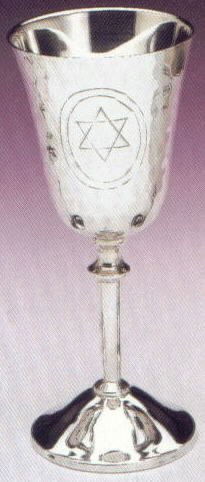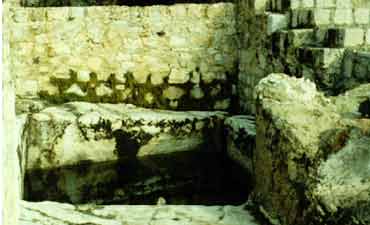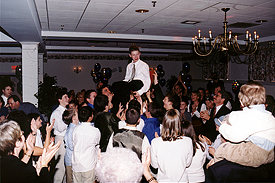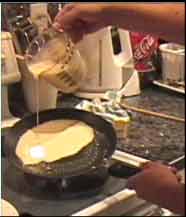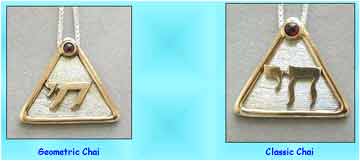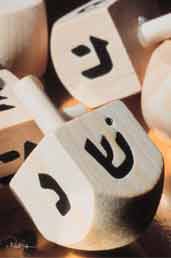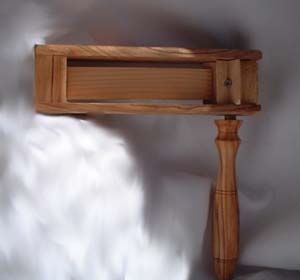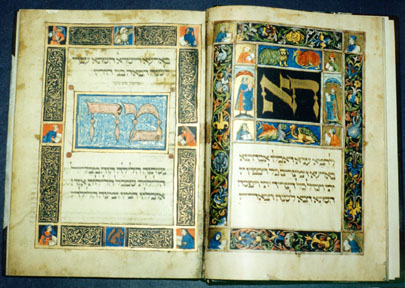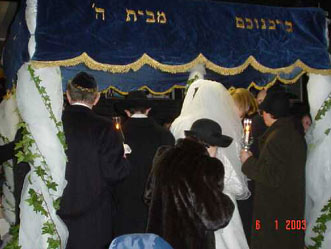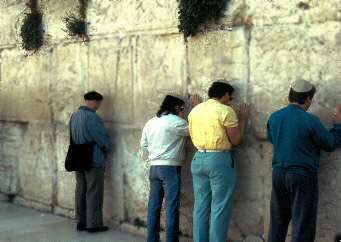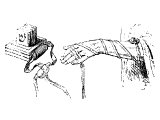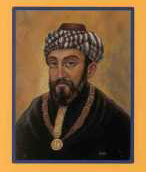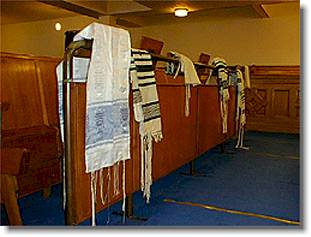A
Abba
Means 'father' sometimes seen as simply ab. Used in numerous phrases and constructions, such as ab bet din (lit. “father of/in the house of judgment”) for one of the presiders in the Jewish sanhedrin
Abraham (Avraham)
(adj. Abrahamic). The patriarch who is acknowledged as the father of the Jewish people. Presumed to have lived sometime in the period 2000-1700 B.C.; father of Ishmael by Hagar and of Isaac by Sarah. See Bible Genesis 12-25; New Testament Galatians 3-4.
Abwehr
Intelligence services of the Wehrmacht. Most of their activities were gradually taken over by the SS, being absorbed by it in 1944.
Acacia Tortilis (The Umbrella Tree)
A tree prevalent in the southern wadis (valleys) of Israel.
Produces a large number of pods that are eaten by wild and domestic animals, and sometimes by man. The pods are tightly coiled spirals, pale brown and fall to the ground unopened. They accumulate in large numbers and are eaten with relish by such animals as kudu, impala, rhino and elephant. This is the manner in which the seeds of the unopened pod are dispersed for propagation and better germination after passing through an animal's stomach. The pods of some other acacia trees split before falling to the ground, thus dispersing the seeds by scattering.
Acharit HaYamim
'End of days'
Adonai
'Lord'
Adon Olam
There are different versions of it including a Chasidik version. What it is is a liturgical hym depicting the unity and providence of G-d. it's usually recited at the beginning and end of the service and also at one's deathbed. It's origin isn't known exactly but traditionally it's ascribed to Solomon ibn Gabirol. Click on the play button on the right to hear it.
Afikomen
'dessert' -- it contains a broken piece of matzah and is hidden during the Passover seder only to be brought out at the end of the meal (hence 'dessert').
Alephbet
The Hebrew alphabet -- 'aleph' is first letter of alphabet, 'bet' is second.
Aliyah
To immigrate to the land of Israel, also being called to read from Torah at shul or to recite the blessing.
Amain
Same as Amen (Some prefer Omein)
Amidah
'Standing' prayer that originally consisted of 18 benedictions, but interestingly, a 19th malediction (a curse) was added to the Amidah, intended (supposedly) as a jab against Jews who believed in Yeshua as messiah, since it cursed 'heretics' to traditional Judaism.
Aninut
Mourning period immediately following burial.
Anomianism
'Lawlessness' that is, 'without Torah' or 'having no Torah.'
Antisemitism
Literally means 'against the Semites' which includes all Semitic peoples, but today used mostly to describe hatred and crimes against the Jewish people.
Apocrypha
Books included in the Septuagint and Vulgate but excluded from Jewish and Protestant canons of the Old Testament.
Aramaic
A Semitic language known since the ninth century B.C.; official language of the Persian empire; used extensively in southwest Asia and by the Jews after the Babylonian exile; the cursive script replaced the ancient paleo-Hebrew script for secular writing as well as for holy scriptures.
Ashkenazi
Eastern and central European Jews also, Jews from France; Ashkenazi have customs that differ from Sephardic Jews.
B
Baptism
Many Messianics do not use this term. We refer to
believer's immersion or mikva. Baptism again is associated
with the "forced conversions and baptisms,"
perpetrated against Jewish people by anti-Semites of
the past, who did these things in the Name of Jesus.
We seek to refer to the Messianic MIKVAH, the
immersion of believers, which had its origin in
Jewish practice. Our purpose in this is to
emphasize the true Jewish roots of our faith, and
separate ourselves from those people and their
actions who profaned the name of the Messiah by
their deeds which were CONTRARY to His teaching.
Baptism is an integral part of the New Birth described in God's New Covenant Scriptures. Two types of baptism are described - baptism in water and baptism in the Holy Spirit (Ruach HaKodesh).
Bar Kochba Simeon ben Kozeba
Led a Jewish revolt against Rome in 132 CE, the name means 'son of a star.' Messianic Jews did not participate in this revolt since traditional Jews considered Bar Kochbar a Messianic figure. This refusal of Messianic Jews to participate in this revolt caused a further breakdown of relations between Jewish believers and traditional Jews.
Bar Mitzvah
Non-Scriptural rite of passage, literally means "Son of the Commandment" and is achieved at age 13 when a boy reaches an age of responsibility towards G-d's Torah. Originated in the Talmudic age and became a popularized ritual in the 16th and 17th centuries.
Bat Mitzvah
Non-Scriptural rite of passage, literally means "Daughter of the Commandment" and is achieved at age 12 when a girl reaches an age of responsibility towards G-d's Torah. First known Bat Mizvah occured in 1921 for Judith Kaplan, the daughter of Reconstuctionist movement founder, Mordecai Kaplan.
Baruch
'Blessed' (Blessings begin 'Baruch atah adonai....').
Baruchot/Berachot
Blessings (formal)
B.C.E.
Before the Common Era; indicates that a time division falls before the Christian era; It means the same thing as B.C. but many Jews don't like to say BC as it means "Before Christ"
Beit Din
This is a court established to resolve issues within G-d's community -- the first known Messianic Beit Din was in Jerusalem, headed by the Apostle James.
Beit Midrash
Literally means "House of Study"
Believer
Many Messianics use this term instead of the term "Christian." Many Jews consider"Christians" to be those people who hate and persecuted the Jewish people for two millennia. "Christian" is used only twice in the New Covenant Scriptures. An earlier term is Believers, and can be used generically of those who are Messianic as well as those who are in traditional churches, who TRULY believe in Yeshua and seek to follow Him. By using the term "believer," we are focusing on a person's having made a commitment to follow the L-rd
and not bringing in the excess baggage of those who called themselves "Christians" but did not walk as He walked.
Binyan Av
Rabbinic argument style where a foundational passage serves to interpret other passages.
Blintz
A crepe-like treat filled with cheese or fruits.
B'nei Noach
Gentiles who reject Yeshua, but choose to obey the 7 laws of Noah as interpreted by traditional rabbis rather than committing to full conversion to Judaism and receiving whole Torah.
Brit Chadasha
'New Covenant' aka New Testament.
Brit Milah (Bris)
The 'Covenant of Circumcision' as given to Abraham, performed on the 8th day by all of Abraham's descendants. Brit Milah is also practiced as part of the conversion ritual to Judaism, a practice which dates back to the Pharisees.
C
Calendar
The Biblical calendar is lunar-based and its months were generally referred to numerically (1st month, 2nd month etc.). The modern Jewish calendar was influenced by the Babylonian calendar and some month names are Babylonian in origin. The only months mentioned by their Hebrew names in Scripture are: Aviv, Ziv, Sivan, Elul, Ethanim, Bul, Chisleu, Tevet, Shevat, and Adar. Other month names, like Nisan (which replaces biblical Aviv), Tammuz, Av, Iyyar (which replaces biblical Ziv), Heshvan (which replaces biblical Bul) and Tishri (which replaces biblical Ethanim) are borrowed from the Babylonian calendar.
Canon:
a collection of books accepted as holy scripture.
CE 'Common Era' -
used in place of 'AD' by traditional Jews because 'AD' means 'the Year of Our L-rd' and reckons time by the birth of Yeshua. See BCE above for further explanation
Chachkas
Yiddish for bric-a-brac
Chag Sameach A greeting used to mean 'Happy Holiday' during the festivals. Can be personalized for the specific moedim: Chag Pesakh, Chag Sukkot, etc.
Chai Means 'life' -- a popular greeting is 'L'chayim' meaning 'to life.' In Jewish mysticism, the numeric value of words are often added up to find hidden meanings in words. The letters comprising "Chai' equal a total of 18, hence the practice of giving money and donations in increments of 18 dollars.
Challah A braided sweet egg bread served traditionally in a loaf shape for the weekly shabbat and served in a round shape for Rosh Hoshana.
Chametz Means 'leaven' which is forbidden during Pesakh (Passover) and Chag HaMatzah (Unleavened Bread).
Chanukah Means "Festival of Dedication" and commemorates both the battle triumph of the Maccabees in recapturing Jerusalem and the temple, as well the miracle of the olive oil burning for 8 straight days in the temple following this victory.
Chanukiah The 9-branched menorah used at Chanukah, as opposed to the biblical 7-branched menorah.
Charoset Traditionally, this is mixture of apples, raisons, nuts and wine served at Pesakh (Passover) to represent mortar on the seder plate.
Chasidic A sect of Orthodox Judaism.
Chaver, Chaverim Chaver means 'friend' -- Chaverim is plural, 'friends.'
Chol v'chomer Popular rabbinic argument style found in many Jewish writings, including Brit Chadasha (New Testament) meaning from lesser to greater (or greater to lesser) "If this .... then how much more so..."
Cholent A traditional stew that is kept warm to avoid cooking on Shabbat.
Chukkim Torah commands whose reasons aren't fully explained in Torah -- we obey them without understanding their purpose simply because G-d commanded us to.
Chumash Means 'five' and is a book which includes all the Torah Parshot and Haftorah readings.
Chuppah The canopy which the bride and groom stand under
Churban - destruction or disaster. Frequently used in the phrase "First Churban" to refer to the events relating to the Babylonian exile and in the phrase "Second Churban" to refer to the destruction of Jerusalem and the death of 1,100,000 Jews following a siege by the Roman general Titus.
Circumcision Foreskin removal -- the commandment was given by G-d to Abraham; to this day obeyed by the children of Isaac and Ishmael.
Cohen Means 'Priest' -- a descendant of Aaron the Levite and responsible for temple service.
Commandments The Torah instructions, the rabbis counted 613 commandments in all -- these include the decalogue (aka 'ten commandments).
Congregation: We do not refer to our congregations as
"Churches." Churches are associated with anti-
Semitism by Jewish people because in the past, and
in some places today, anti-Semitism has come from
those who profess to be believers and even from the
clergy. Ecclesia refers more to the people than the
building, and "Congregation" does just that. A
synonym in the New Covenant for "ekklesia" is
"sunagoge'" as it is used in James 2:1-6, referring
to a meeting of believers. We therefore use
Congregation or Synagogue in place of Church.
Conversion: A Born Again beliver in Yeshua does not need to convert to Messianic Judaism but it is nessacery for a non believer to convert to Christianity or Messiaqnic Judaism
Counting of the Omer Counting the days between Pesakh (Passover) and Shavuot (Pentecost).
Covenant: This is a reference to Testament. Instead of old
Testament and New Testament, we refer to them as Old
Covenant and New Covenant. It is also a legal agreement between God and Israel. The Sinaitic Covenant is frequently termed Torah.
Cross: Many Mesianics avoid the symbol of the CROSS. To Jewish people it is a symbol of persecution in Jesus' Name.
D
Davar Halameid Mi'Inyano
Rabbinic argument style where one verse is understood by the context of total passage
Daven
A style of prayer, a kind of rocking back and forth while praying (see animation on right)
Days of Awe
Traditionally, the ten days following Rosh Hoshana and preceding Yom Kippur; aka "Ten Days of Awe." This is a time to examine one's life, make peace, seek forgiveness and make amends for all the wrongs committed in the previous year.
Diaspora
The dispersion of the Jewish people to lands outside of Israel. Also often called the Galut or the Exile. Exile is a Sinaitic Covenant judgement (see Vayikra/Leviticus 26:33 and Dvarim/Deuteronomy 28:64
Dispensationalism
Relatively new church doctrine which divides G-d's Plan up into two separate dispensations; it pits Torah against Grace; an age of Israel against a church age. Basically, Dispensationalism creates a confused G-d and confused followers. It leads to anomianism (lawlessness) and pre-tribulational eschatology scenarios to accommodate G-d's supposed 'two sets of people.' Dispensationalists read the bible in terms of 'this applies to me, this doesn't apply to me' instead of acknowledging G-d has One Way for *all* His children.
Dreidel
A Chanukah game using a spinning top containing the Hebrew alephbet letters: Nun, Gimmel, Hey, and Shin. These letters stand for nes godal hayah sham ("a great miracle happened there"); but in Israel, the 'Shin' is changed to 'Peh' so it will stand for "a great miracle happened here."
E
Ein Sof
Means 'unending' -- in Jewish mysticism represents the essense of the infinite G-d.
Elohim
Means 'G-d,' 'gods,' and 'judges.'
Essenes
A sect of Judaism begun a couple hundred years before Yeshua --- the Dead Sea Scrolls found at Qumran were Essene manuscripts.
Ethics Of The Sages/Fathers
Rabbinic writing known as "Pirke Avot", traditionally studied between Pesakh (Passover) and Shavuot (Pentecost).
Etrog
Citris fruit used during festival of Sukkot.
Eyshet Chayil/Eshet Chayil
Means 'woman of valor' as taught in Proverbs 31:10-31
F
Fleishig (or basar)
Means 'meat' in Yiddish. According to rabbinic Judaism, dairy products cannot be used with meat products, so kitchen utensils are kept separate to designate if they are for dairy (milchig) or meat (fleishig).
G
Galut - The dispersion of Jews from the land of Israel. Also often called the Diaspora or the Exile. Exile is a Sinaitic Covenant judgement (see Vayikra/Leviticus 26:33 and Dvarim/Deuteronomy 28:64.
Gefilte Fish
Stuffed Fish dish. Tastes great but you don't want to know what's in it.
Gemara
Commentaries on the Mishneh --
the Mishneh and Commentaries together form the Talmud. The Mishna was in place when Yeshua was here and he believed it should be followed but later there were additions made to it that are not sanctioned by Him
Gematria
Kabbalist numerology which seeks out hidden meanings in words based on the numeric value of its letters.
Gentiles
Goyim (pl) Goy (sing) for nations.
Get
A divorce decree given to the wife, aka sefer kritut.
Gezeirah Shavah
Rabbinic style argument by analogy -- comparing similar words in different Scriptural passages.
Glatt Kosher
Means 'smooth' -- referring to the smooth lungs of a non-diseased kosher animal slaughtered. It doesn't mean 'extra kosher' or 'premium kosher' as some misuse the term.
Goy/Goyim
Means 'nations,' sometimes translated "gentiles.' Common usage today is as a 'non-Jew,' however, Israel itself is a goy/nation: "And ye shall be unto me a kingdom of priests, and an holy nation (Strong's 01471 - 'goy)'. Exodus 19:6a
Grogger
Noisemaker used during Purim whenever Haman's name is mentioned.
Gut Shabbes/Gut Shabbos
Greeting of "Shabbat Shalom" (Peaceful Sabbath) in Yiddish as "Good Sabbath."
H
Haftarah
Weekly reading from the Prophets, read in addition to Torah Parsha.
Haggadah
Means 'the telling' of the Exodus, it codifies the order of the Pesakh meal (seder).
Halachah
Means 'the way to walk' and are rabbinic interpretations of how Torah is to be obeyed.
Hallel
Songs of praise found in Psalms 113-118 and read on Pesakh (Passover).
Haman
Evil high ranking official in King Ahasuerus's court who tried to get the king to exterminate all the Jews in the land. Through G-d's provision, the Jews were able to survive this attempt.
Hamentaschen
A triangular dessert cookie served at Purim.
Hamesh/Hamsa Hand Hamesh/Hamsa
means 'five.' In Jewish mysticism, this was an amulet to protect its wearer from the evil eye.
Hanukah/Hanukkah
Means "Festival of Dedication" and commemorates both the battle triumph of the Maccabees in recapturing Jerusalem and the temple, as well the miracle of the olive oil burning for 8 straight days in the temple following this victory.
HaShem
'The Name.'
Havdalah
Means 'separation.' An traditional observance marking the end of the weekly Shabbat/Sabbath with wine and spices.
I
J
Jesus -
The English version of the Greek name IESOUS, itself a form of the Hebrew/Aramaic Yeshua or Yehoshua, meaning salvation.
Jew
Means 'Praiser' -- comes from 'Judah. Today means those from tribes of Judah, Levi, Benjamin and others who returned to Israel following Babylonian captivity.
Jewish Law
Includes the Ten Commandments, the Torah, the Old Testament and the Oral Law or any combination of these.
K
Kabbalah
Book of Jewish Mysticism. It dabbles in witchcraft
Kashrut
Means 'proper' and refers to Kosher dietary laws.
Kavanah
Means 'intention'
Kelal Ufrat
A rabbinic argument style where a general summary statement is followed by an explanatory, more specific statement.
Ketubah
A traditional Jewish marriage contract
Kethuvim/Ketuvim
The Writings, the section of the TaNaKh containing: Psalms, Proverbs, Job, Song of Songs, Ruth, Lamentations, Ecclesiastes, Esther, Daniel, Ezra, Nehemiah, and The Chronicles.
Ke Yotzei Bo Mimakom Acher "Like it says elsewhere" Rabbinic argument style where the explanation of a word in one text is clarified by use of same word in an unrelated text.
Kiddush
Prayer of santification recited over a cup of wine to consecrate the Sabbath or a festival
Kippah Aka Yarmulke -- this is the skullcap worn by Jews, the cap is a fairly recent non-Scriptural tradition.
Kittel White garments for burial, sometimes worn also for Yom Kippur services.
Kli Gever Refers to the prohibition against the dress and habits of the other sex
Knaidelach Matzo balls
Knish Stuffed potato and flour dumpling.
Kohen/Kohanim Means 'Priest' -- a descendant of Aaron the Levite and responsible for temple service.
Kol Nidre The prayer that begins the Yom Kippur service.
Kosher Foods that Torah permits man to eat are kosher. Used loosely to mean anything permissible for G-d's people.
Kugel Seasoned pudding made from noodles or potatoes.
L
Lag b'Omer Means the 33rd day of the Omer since in jewish mysticism the sum letter totals of "lamud" and "gimmel" in 'Lag' equal 33. Tradition teaches that during the destruction of the second temple, many of Rabbi Akiva's students were dying of an epidemic, but on this day, the epidemic creased and students lived. In commemoration, this day is a day of rejoicing.
Latkes Fried potato pancakes eaten during Chanukah with applesauce or sour cream on top.
Lashon Hara Means 'evil tongue' and is a prohibition against harmful speech against others
L'Chayim From 'Chai' meaning 'life' -- this popular greeting means 'to life.' In Jewish mysticism, the numeric value of words are often added up to find hidden meanings in words. The letters comprising "Chai' equal a total of 18, hence the practice of giving money and donations in increments of 18 dollars.
Leap Year Due to differences in year length between the modern solar calendar year and the Biblical lunar calendar year, a leap year is added to realign the calendars.
L'hitraot Means 'see you' used instead of goodbye or shalom in a more casual 'see you soon' sort of way.
Lox Smoked salmon
L'Shanah Tovah Means 'for a good year' and is a popular greeting at Rosh Hashana.
Lulav This is the palm branch waved during Sukkot (Festival of Tabernacles/Booths)
M
Machzor A prayerbook used during the high Holy Days.
Magen David/Mogen David Six-pointed star of David used as symbol of Jewishness today. Somewhat dubious history with pagan origins; first Jewish use was in 13th century Prague and later adopted by Zionist mov't in the 19th century. While Nazis forced Jewish people to wear the star, today the star's popularity is such that it's become the symbol of Jewishness worldwide.
Maimonides The famous Jewish scholar/author Rabbi Moshe ben Maimon (1135-1204) better known as 'Rambam.'
Mashiach/Moshiach Means 'annointed' and translated as Messiah or Christ.
Matzah Unleavened bread eaten during Pesakh (Passover) which Yeshua used to designate His body at the last Pesakh seder (Last Supper) prior to His crucifixion.
Matzah Ball Soup This is a soup that uses matzah balls (matzah meal, egg, oil, seasonings) in a chicken broth; can be made with or without added vegetables.
Matzah Meal Crumbs from crushed matzah bread; used as a flour or for breading.
Mazel Tov Means 'good star' or 'good constellation' and comes from Jewish mysticism; commonly used today as 'congratulations.'
Mechitzah In strict congregations, this is a curtain or partition between men's and women's sections at the synagogue or other religions functions.
Megillah Means 'scroll' -- can refer to any of five books of Scripture: Ruth, Song of Songs, Esther, Lamentations or Ecclesiastes but most commonly used during Purim, referring to the Megillah of Esther.
Menorah The seven-branched candlestick G-d commanded the Israelites to make.
Messiah Means 'annointed' and comes from the Hebrew word 'mashiach.' Yeshua was the Messiah foretold in the TaNaKh.
We often use this term instead of "Christ". Christ is derived from the greek word meaning Anointed One. By using the Hebrew term rather
than the Greek, we are again, emphasizing that the Messiah is for Jewish people, and not exclusively for Gentiles. A secondary reason is because many countless thousands and perhaps millions of Jewish people have been persecuted and butchered in the name of Christ. Christ carries a non-Jewish, as well as anti-Jewish
connotation to many Jewish people.
Messianic: This refers to those believers who are involved in a
Messianic congregation, whether Jewish or Gentile.
All are Messianic believers, but Messianic Jews, are
those in such congregations who are of Jewish descent.
Messianic refers to that expression of the Biblical
faith which expresses itself in a Jewish manner.
Messianic Age A thousand year period where Yeshua will rule the earth as its king. Israel and Judah will be reunited, the temple will be rebuilt, the resurrection will occur, there will be peace on earth.
Messianic Judaism: A worldwide movement of Jewish people who believe that Yeshua is the promised Jewish Messiah and Saviour for Israel and the world. Messianic Judaism depends entirely on the Scriptures.
Messianic Jew: A Jew who believes that Yeshua is the Messiah AND remains Jewish in lifestyle and worship.
Mezuzah Means 'doorpost' -- this is a rabbinic tradition where a miniature scroll is affixed to a doorway. The mezuzah contains two verses inside it, Deuteronomy 6:4-9 and 11:13-21. G-d instructs us in these two passages to "Lay up these my words in your heart and in your soul, and bind them for a sign upon your hand, that they may be as frontlets between your eyes. And ye shall teach them your children, speaking of them when thou sittest in thine house, and when thou walkest by the way, when thou liest down, and when thou risest up. And thou shalt write them upon the door posts of thine house, and upon thy gates." "These words" refer to His Torah. Yet ironically, the mezuzah doesn't put the actual Torah on doorposts, instead it mocks the command by merely parroting the command that we should put Torah on our doorposts. Oy. Further, if we take this command literally, we also need to surgically put a mezuzah in our heart and soul, and add one to fenceposts as well. Clearly the verse is meant to say "Keep My Torah inside of you and around you always and teach It to your children so they will do the same."
Midrash Means 'study'
Mikveh Means 'gathering' and was a ritual bath used achieve ritual cleanliness by priests. Later rabbinic writings associated this ritual bath with female cleanliness following her menstrual cycles; mikveh is also used for female conversions in modern Judaism. At the time of Yeshua, mikveh was used to identify one's religious affiliations and to renew one's faith -- baptism itself is a type of mikveh.
Milchig Means 'dairy' in Yiddish. According to rabbinic Judaism dairy products cannot be used with meat products, kitchen utensils are kept separate to designate if they are for dairy (milchig) or meat (fleishig). The actual command in Scripture in Exodus 34:26b reads: "Thou shalt not seethe a kid in his mother's milk." It is from this passage the rabbis interpreted that no meat should be consumed with dairy.
Minyan Means 'number' and refers to the necessary quorum for religious services (which is ten adult men).
Mishneh Rabbinic writings codified about 200 CE.
Mitzvah/Mitzvot Means 'commandment' -- used to mean any commandment or good deed one might perform.
Moedim Holy Days -- G-d's appointed times.
Mohel The one who performs the circumcision on an eight day old male baby.
Mosaic: Comes from the name Moshe (Moses). We at Mosaic Ministries call ourselves "Mosaic Jews". We feel that the term Messianic is being used to describe Saved Jews who do not follow G-d's Laws along with those who do follow G-d's commandents. Mosaic Jew describes us better and allows others to know exactly who we are.
Mysticism Mysticism became markedly important in rabbinic Judaism following the Babylonian captivity. Astrology, numerology, and general interest in the occult flourished. Today most evidenced by Kabbalistic studies.
N
Ner Tamid Means 'eternal light' -- symbolizes the menorah that burned constantly in the temple.
New Covenant - A legal agreement by God with the house of Israel and the house of Judah which became necessary when the Covenant made at Sinai was broken repeatedly. It is described briefly in Yirmiyahu/Jeremiah 31:29-37, Yechezkiel/Ezekiel 18 and also in God's New Covenant (Testament) Scriptures.
Nevi'im The Prophets, the section of the TaNaKh containing: Joshua, Judges, Books of Samuel, Books of Kings, Isaiah, Jeremiah, Ezekiel, Hosea, Joel, Amos, Obadiah, Jonah, Micah, Nahum, Habakkuk, Zephaniah, Haggai, Zechariah, and Malachi.
Niddah The laws governing separation of man and wife during her menstrual cycle.
Noahic Commandments (Noachide Laws) Seven commandments the rabbis interpret as governing all mankind, Jew and non-Jew alike.
A promise made by God to mankind generally (see Genesis 9:8-17. A later fabrication is also sometimes referred to by the same term but the fabricated content is not mentioned in the authentic description of the Noachide Covenant.
O
Olam Haba Means 'the world to come' and refers to the Messianic age when Yeshua will rule and peace will abound.
Old Testament Using Septuagint book ordering, this is the Christian "TaNaKh."
Omer Means 'sheaf' and used a unit of measure in Scripture.
Onah Sex for recreational pleasure instead of pru u'rvu (procreation)
Oneg Shabbat Means 'Sabbath Delight' -- this is a celebration occuring after services at many synagogues on Shabbat.
Oral Torah/Oral Law These are traditional writings written by rabbis and scribes. Considered by traditional/rabbinic Judaism to be as inspired as Scripture itself, called the Talmud, which consists of Mishneh and its commentaries (Gemara). Messianic Judaism does not consider the oral tradition equal to the Bible.
Orthodox Strictest sect of Judaism, devotes tremendous amount of study not only to Torah and Talmud, but to Jewish mysticism (Kabbalah) also.
P
PRDS PaRDes Four rabbinic levels of Torah understanding: Pashat-simple; Remez-hint; Drash-search; Sod-hidden
Parah Adumah Red heifer mentioned in Numbers 19 -- the ashes of this heifer were for purifying purposes.
Pareve (parve) Means 'neutral' and refers to foods that contain neither meat or dairy products.
Parsha The weekly Torah readings read at shul and studied at home.
Pasach
The major Jewish spring holiday (with agricultural aspects) also known as hag hamatzot (festival of unleavened bread) commemorating the Exodus or deliverance of the Hebrew people from Egypt (see Exodus 12-13). The festival lasts eight days, during which Jews refrain from eating all leavened foods and products. A special ritual meal called the Seder is prepared, and a traditional narrative called the Haggadah, supplemented by hymns and songs, marks the event.
Passover (see Pasach directly above)
Patriarchs Refers to Abraham, Isaac and Jacob -- forefathers of the Jewish people.
Pentecost Greek for 'fifty' and is the festival of Shavuot -- this was when the Ruach (Holy Spirit) fell on the apostles in Jerusalem.
Peyot The side locks (hair) worn by Orthodox men, a relatively new practice begun a couple hundred years ago by the Chasidic Jews.
Pharisees/P'rushim Ancestor to modern day rabbinic Judaism -- this sect of Judaism was flourishing at the time of Yeshua -- they put great importance on the oral tradition. After the destruction of the temple, most other sects of Judaism died out, leaving Pharisaic Judaism to dominate.
Phylacteries These are leather boxes containing scrolls with Scripture passages, the rabbis interpreted G-d's command to wear His Word on hands and forehead -- for more info, see Mezuzah.
Pirkei Avot Also known as "Ethics of the Sages/Fathers," this is a rabbinic tractate traditionally studied between (Passover) and Shavuot (Pentecost).
Pneuma Means 'the wind' 'to breathe' or 'blow' -- Greek for 'Spirit'
Pru u'rvu Sex for procreation purposes as opposed to onah (recreational, sexual pleasure)
Purim Means 'lots' and is the celebration of Jewish victory after the failed attempt to exterminate Jews from Persia -- story found in scroll of Esther.
Q
R
Rabbi Means 'teacher' but modern Judaism tends to require a degree or some sort of certification -- a knowledgeable layman generally won't earn such a title anymore.
Rabbinic Judaism: Judaism centered around Rabbininc writings and teachings. Birthed in 70 A.D. after the destruction of the Second Temple. Prior to that Judaism was centered around the Temple and the Torah, The Law of the five books of Moses. After the destruction the Rabbis reorganized Judaism introducing many new laws, traditions and rules into what has become the Talmud. There are many branches of Rabbinic Judaism, Orthodox, Chassidic, Reform, Conservative and Reconstructionist.
Rambam Famous Jewish scholar/author Rabbi Moshe ben Maimon (1135-1204) also known as 'Maimonides.' You may already be familiar with his: Thirteen Articles of the Jewish Faith and Eight Levels of Charity
Rashi Famous bible commentator, Rabbi Shlomo Yitzchaki (1040-1105 CE).
Rebbetzin Means the wife of a rabbi
Reconstructionism Founded by Mordecai M. Kaplan (1881-1983), it Defines itself as an evolving and more dynamic Judaism.
Red Heifer (Parah Adumah) Red heifer mentioned in Numbers 19 -- the ashes of this heifer were for purifying purposes.
Reform Founded by Rabbi Isaac Mayer Wise, this is a more progressive sect in Judaism, more liberal in its treatment of women and more liberal in its conversion requirements.
Reincarnation Reincarnation is taught in the Talmud as Din Gilgol Neshomes, meaning '"the judgment of the revolutions of the souls." This is another reason why Talmud is not considered on par with Scripture by Messianics.
Repentance - A recognition of and turning away from past sin against God. It includes both a change of attitude and, if genuine, a change of behaviour.
Replacement Theology False church doctrine which teaches the church replaces Israel in G-d's Plan. Basically all the blessings promised to Israel are usurped by the church (though the replacement theologists generally allow Israel to keep all the curses she was promised -- Oy!).
Rosh Chodesh Means 'head of the month' -- the new month begins when the first sliver of the new moon is seen.
Rosh Hashana Traditional Judaism refers to Rosh Hashana as the 'new year' but this is actually inaccurate from a Scriptural point of view. In Scripture, Rosh Hashana (or "Feast of Trumpets/Shofar) occurs in the seventh month, not the first month. It is not the new year at all according to biblical year reckoning.
Ruach Means 'Spirit' from Hebrew for 'wind, breath, air, strength, breeze.'
Ruach Elohim - One of the phrases used in the Hebrew text of the Tanakh to refer to the Holy Spirit.
Ruach HaKodesh Means 'Holy Spirit'
Ruach Yahveh - Holy Spirit. Ruach Yahveh is the most common term explicitly used in the Hebrew text of the Tanakh to refer to the Holy Spirit.
S
Sabbath From 'Shabbat' -- G-d blessed and sanctified the seventh day of the week as a day of rest.
Sacrifice Modern Judaism doesn't offer sacrifices since the temple has been destroyed; but Messianics view Yeshua as sin sacrifice.
Sadducees This sect of Judaism died out with the loss of the temple in 70CE, since their whole belief revolved around temple work, and not oral tradition.
Sages Refers to the great Jewish scholars whose work is preserved still this day in oral tradition.
Sandek The person who holds the baby during his circumcision -- often the child's grandfather.
Second Churban - The destruction of Jerusalem which resulted in the deaths of some 1,100,000 Jews at the hands of the forces of the Roman Empire and was the beginning of an exile lasting over 1,800 years.
Seder Means 'order' and is usually used to refer to the Pesakh dinner using the Haggadah as a guide.
Sefer Means 'book' -- can be used generically for any religious books, or used more specifically as in "Sefer Torah" (books of Torah) or "Sefer Yetzirah" (book of creation).
Sefer Kritut Means 'cutting off the book/writing' -- a divorce decree given to the wife, aka a 'get.'
Sefirot In Jewish mysticism (according to Kabbalah) there are ten Sefirot or Divine Emanations of G-d.
Selichot These are special prayers for forgiveness recited on fast days.
Sephardic Jews Jews from Spain, Portugal, Africa and middle eastern countries.
Septuagint LXX Means 'seventy' for the seventy scribes who translated the Torah into Greek around 3nd century BC; the Writings and Prophets were translated later, 2nd century BC.
Shabbat Means 'sabbath' G-d blessed and sanctified the seventh day of the week as a day of rest
Shabbat Shalom Means 'peaceful sabbath' -- a common greeting when Shabbat is approaching.
Shalom Means 'peace' but also used as a greeting to say hello or goodbye.
Shalom Aliechem Means 'peace to you' or 'peace unto you' -- a greeting.
Shalom Bayit/Shalom Bayis Means having/maintaining peace within the home.
Shammus Means 'servant' and is the candle used to light other candles in menorah; also, a synagogue custodian.
Shavua Tov Means 'good week' and is a popular greeting when shabbat ends.
Shavuot Means 'weeks' -- known in Greek as Pentecost.
Shehitah Means 'slaughter' and refers to kosher slaughtering of animals.
Sheitels Yiddish for 'wigs'
Shekinah/Shechinah (-h also) Means 'divine presence of G-d' -- a term frequently bandied about by Messianics who do not realize the word appears no where in Scripture and comes straight from the Kabbalah rooted in Jewish mysticism.
Shema Means 'hear' and is the quintessential Jewish text from Dvarim/Deuteronomy 6:4.: "Hear, O Israel: The LORD our God is one LORD" showing the uniqueness of the G-d of Israel. Israel didn't require many gods (like harvest gods, fertility gods, fire gods) The G-d of Israel is unique and infinite -- He alone is sovereign.
The Shema is a confirmation in Torah that Yahveh is a compound unity ("echad") not as is commonly misunderstood.
Shemoneh Esrei "Standing" prayer that originally consisted of 18 benedictions, but interestingly, a 19th malediction (a curse) was added to the Shemoneh Esrei intended (supposedly) as a jab against Jews who believed in Yeshua as messiah, since it cursed 'heretics' to traditional Judaism
Sh'enei Ketuvim Rabbinic argument style where two laws that seem to contradict are settled by another verse which resolves the conflict.
Shiva Means 'seven' and refers to the one week period of mourning following the death of a family member.
Shloshim Means 'thirty' and refers to the one month period of mourning following the death of a family member.
Shoah - The Holocaust.
Shochet Person who butchers kosher animals.
Shofar Ram's horn, also translated 'trumpet' in some bibles.
Shul Synagogue in Yiddish.
Siddur Prayer book
Simchat Torah Means rejoicing in Torah and celebrates the ending and beginning of the Torah parshot annual reading cycle.
Sinaitic Covenant - A legal agreement made between Yahveh the God of Avraham, Yitzak and Yaaqov at Sinai. The Sinaitic Covenant included obligations on God and obligations on the Israelite community.
Sukkah Means 'booth' and translated 'tabernacles' in some bibles. Shaul the tentmaker may have been a sukkah maker.
Sukkot Means 'booths' -- this is the festival of tabernacles which commemorates G-d's protection on Israel when she lived in tents under His protection.
Synagogue From the Greek synagogia, this is a meeting place for assembly.
T
Tabernacles From 'sukkot' means 'booths' -- this is the festival of tabernacles which commemorates G-d's protection on Israel when she lived in tents under His protection.
Taharat HaMishpachah Family purity laws which govern the separation of a man and his wife during her menstrual cycle.
Tallit Prayer shawl with tzitzit (fringed edges), based on the command in Numbers 15:38 and Deuteronomy 22:12 that men wear Tzitzit on their garments. The prayer shawl is a rabbinic compromise to this law since a tallit isn't quite a garment, but it does contain tzitzit.
Tallit Katan Closer to a garment than the regular prayer shawl, this is worn under clothing and contains the commanded tzitzit.
Talmud The collection of oral tradition: the Mishneh and Gemara/commentaries.
TaNaKh/Tenach/TNK Jewish Scriptures, divided into three sections: Torah, Nevi'im (prophets) , and Ketubim or kethuvim (writings) -- hence acronym: TNK- TaNaKh. Referred to by Christians as "Old Testament" though the book ordering differs from the Christian Bible.
Tanakh (also Tanach) - the Hebrew Scriptures The term Tanakh is derived from initial letters of the three sections of the Hebrew Scriptures - Torah, Neviim and .
Tashlisch Means 'casting away' and refers to a tradition on Rosh Hashana of casting bread into a body of moving water to symbolize sins being removed.
Techelet/T'chelet/Tekhelet The blue cord on each corner of the tzitzit, "Bid them that they make them throughout their generations fringes in the corners of their garments, and that they put with the fringe of each corner a thread of blue." Numbers 15:38 Traditional Judaism doesn't add the blue cord to their tzitzit, arguing they aren't sure about identifying the chilazon, a snail of Tyre from which the Phoenicians traditionally extracted the blue dye. Second century sages felt this was too expensive a dye to use, so they waived the biblical requirement, lest people use a cheaper dye instead and break the oral law. Written Torah never commanded the blue dye come from this particular snail, in fact, any blue dye would fulfill this command.
Tefillah Means 'prayer'
Tefillin Means 'remembrance' - these are leather boxes containing scrolls with Scripture passages, the rabbis interpreted literally G-d's command to wear His Word on hands and forehead -- for more info, see Mezuzah.
Teshuvah Means 'return' as in 'return to G-d; teshuvah is the way to repent: to stop and turn in the direction of G-d.
Tikkun Olam Refers to 'repairing the world' through mitzvah -- a noble concept but ignores the fact we need Messiah to return to set things right -- repairing the world isn't man's 'do it yourself' project.
Tisha B'Av Means the 'ninth of Av' -- a fast day remembering the temple destructions.
Torah Means 'instruction' and refers to the books of Moshe -- the 'law' comprised of the books: Genesis, Exodus, Leviticus, Numbers, and Deuteronomy. 'Torah' is also used loosely in traditional Judaism to mean all Jewish law, Scriptural and oral. It can also be used to mean the Ten Commandments
Torah - A term used with various meanings. The fact it has so many uses makes it easy for some to conceal flawed logic. Commonly it is used to refer to the first five books of the Tanakh, either with or without the addition of the "Oral Torah". It may also, more narrowly, be used to refer to the Ten Commandments.
Tractate
A section or book from Mishneh and Talmud.
Treyf/Treif Means 'torn' and refers to non-kosher meat, meats not sanctioned by G-d.
Tu B'Shevat New year for trees, an Israeli-style Arbor day celebrated by planting trees on the 15th of Shevat.
Tzaddik Means a 'righteous person.'
Tzedakah From same root as Tzaddik, meaning righteous, but refers to charity. Many Jewish homes have a small box for collecting money that will later be donated to a charitable cause.
Tzitzit Fringes G-d commanded be attached to the corners of men's garments.
U
Ushpitzin A rabbinic concept of inviting ancesters to one's sukkah (like Abraham, Isaac, Jacob, Joseph, Moses, Aaron and David).
V
Vayikra - the transliteration into English of the third book of the Tanakh (Hebrew Scriptures), also often commonly called Leviticus.
W
Western Wall The remaining portion of the old temple on the temple mount, also called the 'wailing wall.'
World to Come Olam Haba -- the coming messianic kingdom when there will be peace on earth.
X
Xianity - a term used in place of Christianity by religious Jews to avoid the use of the word Christ even in a compound noun.
Y
Yad A hand-shaped pointer used when reading from Torah.
Yahrzeit Means 'anniversary' -- marking the anniversary of a deceased family member.
Yarmulke Aka kippah -- this is the skullcap worn by Jews, the cap is a fairly recent non-Scriptural tradition.
Yahveh - the God who met with Moshe (Moses) at Sinai. Contrary to modern custom the Hebrew text of the Tanakh makes it clear that God was referred to as Yahveh both in speech and in prayer.
Yechezkiel - a transliteration of the Hebrew name of the Tanakh prophet often referred to as Ezekiel.
Yehud/Yehudi Jew and Jews
Yerushalayim/Yerushalom Jerusalem
Yeshiva Talmudic and Torah academy
Yeshiva Bocher Unmarried male student student at Yeshiva
Yeshua Means 'Salvation' and is the real name of 'Jesus' in Hebrew. "And she shall bring forth a son, and thou shalt call his name Yeshua: for he shall save his people from their sins." Matthew 1:21 Transliterated into greek it would be derived in to english as "Jesus." The reason Messianic Jews use Yeshua instead of Jesus, is
because Yeshua is His Name, and because Jewish people
have been persecuted in the Name of Jesus. Yeshua
communicates that our Messiah is for Jewish people, and
not just for non-Jews.
Yetzer Ra In traditional Judaism, this means the 'evil impulse' which leads us to sin if not controlled.
Yetzer Tov In traditional Judaism, this means the 'good impulse' which leads us to obey G-d
Yiddish Originating among Ashkenazic Jews, this language is based on German using Hebrew letters.
Yisrael/Yisroel Israel
Yitzak - son of Avraham (Abraham). He is often referred to as Isaac.
Yom HaAtzmaut modern Israel's Independance Day
Yom HaShoah Holocaust Remembrance Day.
Yom HaZikaron modern Israel's Memorial Day
Yom Kippur Day of Atonement, holy day occuring ten days after Rosh Hoshana (Blowing of Trumpets). "It shall be an holy convocation unto you; and ye shall afflict your souls, and offer an offering made by fire unto YHVH." Leviticus 23:27 "Soul affliction" is interpreted by many to mean fasting.
Yom Yerushalayim Celebrates the 1967 recapture of Jerusalem.
Z
Zealots Revolutionary Judaism sect existing during time of Roman occupation in Israel around 1st and 2nd century BC, sect still popular at time of Yeshua.
Zohar Most likely written by Spanish kabbalist named Moses de Leon in the thirteenth century, some believe de Leon was merely redistributing a text originally written in the 1st century by Rabbi Shimon Bar Yokhai. Kabbalists tend to early-date the Zohar, others tend to late-date it.




